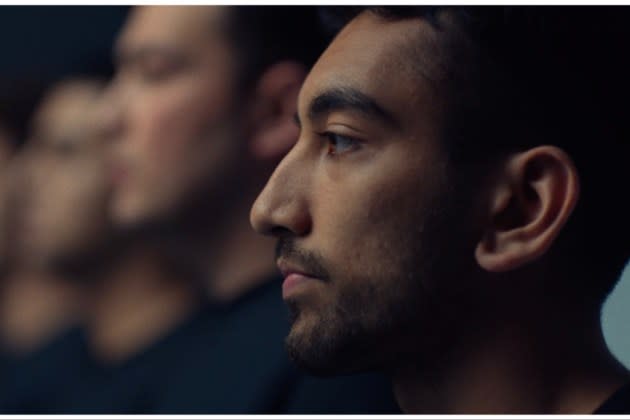Karlovy Vary Standout ‘In Camera’ Is Made for a Generation Who ‘Can Only Focus for a Minute at a Time’
- Oops!Something went wrong.Please try again later.

Naqqash Khalid always wanted to make films.
An English literature graduate of Salford University in Manchester, England, who began his working life as a lecturer in the university’s School of Arts and Media, Khalid dreamed of working with actors to create films that reflect our 21st century experience of a fractured world, dominated by mobile phones and social media, where time no longer seems to follow a linear path.
More from Variety
His chance to make his dreams reality came when a script he wrote while still teaching at Salford was picked up by iFeatures – a BBC Film/Creative England/British Film Institute program for debut directors. A development grant in early 2020 enabled him to realize his script “In Camera,” which had its world premiere Saturday in Karlovy Vary Film Festival’s Proxima competition slot (for the Variety review see here).
Khalid, now 30, says the film enabled him to explore the nature of contemporary life for a younger generation coping with the loss of old structures that once gave shape and form to daily existence.
“What is really contemporary about ‘In Camera’ is its rhythm: it feels like a film made for this generation, which can only focus for a minute at a time,” he said. “We live in an age where we look at an app on our phone and see influencer images, mental breakdowns and genocide. I think the three-act film is no longer fit for purpose and I wanted to make a film that was suitable for our contemporary culture; I wanted to prioritize how things feel, rather than what they are.”
“In Camera” loops around its themes – the nature of being a young man of Black or brown complexion in today’s Britain; the experience as an actor who is subject to a multitude of different projections from others; and the sheer pressures of trying to make one’s way in a fractured culture and society – in a way that is anything but linear.
“When I was writing I was looking at a lot of alternative structure – geometric abstractions, artworks,” Khalid says. “We don’t live in a time that has the neatness for a three-act structure; we live in a disorientating time – as artists we have to respond to that. When you are entering a medium you should question every tool you are using. I had to invent another structure that felt true to me – loops, cycles, tessellations, geometric shapes, and things looping back over and over again.”
The result is a dreamlike film in which the main character Aden, played by Nabhaan Rizwan (known for US TV mini-series “Station Eleven”), plays an aspiring actor who finds rejection – and weird demands – are part of the late-Capitalism world in which he exists. Although the film revolves around his character, his two flatmates – Amir El-Masry (BAFTA winning “Limbo”), who plays an art director in the fashion industry, and Rory Fleck Byrne (BAFTA-winning “This Is Going to Hurt”), as a stressed-out junior doctor – are important characters through which the fractured lives of Britain pressurized younger generation are reflected.
In some ways the characters are as malleable as the world of the mobile-phone obsessed, app-dependent generation pictured in the film.
“This is a film about labor and a fairy tale about late capitalism,” director says. “These three characters are so enmeshed in their jobs they are almost not really people at all. They are not characters in the conventional sense. The film is also joking all the time – but joking about serious topics,” Khalid adds.
Whether or not this is casual racism or exhaustion of a character who experiences strange dreams and visions, is hardly the point, the film is an open invitation to imagine and dream outside the narrative. It is even suggested, that the junior doctor may be a projection of a young man already dead (Aden is invited by grieving parents to take the part of their recently lost son in a bizarre and gruesome supper at their home).
Working with Khalid was a liberating experience, the two actors with him in Karlovy Vary say.
“The film explores how people see acting – the projections and ethically ambiguities they are expecting to internalise,” Rizwan says. “Preparation was thorough, but working with Naqqash involved a lot of sharing of experiences and no particular expectations.”
El-Masry agrees, saying the process was both “academic and free-flowing.”
“The whole process, even the rehearsal process, was cyclical and constantly changing – even the way things were shot were free – we had a start and objective, but Naqqash was very generous in giving us option for scenes but never neglecting the crux of the story.”
The film will likely get a theatrical release before airing on the BBC, probably in 2024, its producers say.
Best of Variety
Sign up for Variety’s Newsletter. For the latest news, follow us on Facebook, Twitter, and Instagram.
